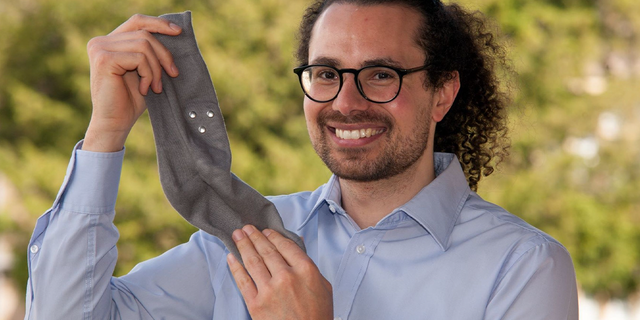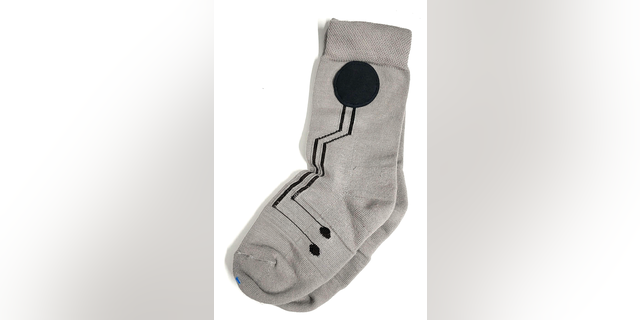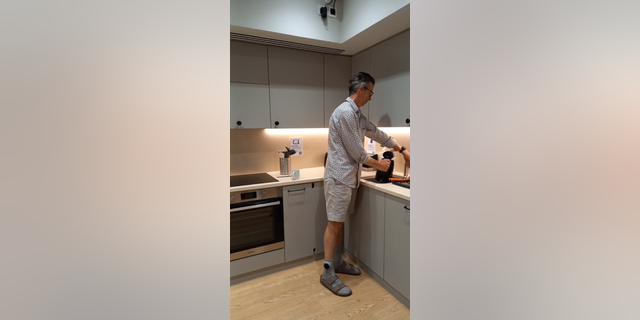
AI detecting cancer in some US hospitals
Doctors believe artificial intelligence is now saving lives after a major advancement in breast cancer screenings. AI is detecting early signs of the disease, in some cases years before doctors would find the cancer on a traditional scan.
People suffering from dementia could live more independently thanks to a pair of AI-powered socks that can track everything from a patient’s heart rate to movement.
Called “SmartSocks,” the AI-powered apparel was created in partnership between the University of Exeter and researchers at the start-up company Milbotix, according to SWNS. The socks can monitor a patient’s heart rate, sweat levels and motion to prevent falls while also promoting independence for those with dementia.
“I came up with the idea for SmartSocks while volunteering in a dementia care home,” SmartSocks creator Zeke Steer, CEO of Milbotix, told SWNS. “The current product is the result of extensive research, consultation and development.”
Steer’s great-grandmother suffered from dementia, which also helped spark the creation of the socks.
TALK THERAPY? AI MAY DETECT ‘EARLIEST SYMPTOMS’ OF DEMENTIA BY ANALYZING SPEECH PATTERNS

Creator Zeke Steer holds a pair of SmartSocks that could help dementia patients live more independently. (SWNS)
“The foot is actually a great place to collect data about stress, and socks are a familiar piece of clothing that people wear every day; our research shows that socks can accurately recognize signs of stress, which could really help not just those with dementia but their caregivers, too,” Steer, who has a background in robotics and AI, told SWNS.
WHAT IS CHATGPT?
The socks send the data collected from the patient to an app, which flags caregivers when the patient appears to be in distress. The warning could prevent falls and even tragedies as caregivers can respond to a patient before their stress escalates.
“I think the idea of SmartSocks is an excellent way forward to help detect when a person is starting to feel anxious or fearful,” said Margot Whittaker, director of nursing and compliance at Southern Healthcare in the U.K.
AI TOOL GIVES DOCTORS PERSONALIZED ALZHEIMER’S TREATMENT PLANS FOR DEMENTIA PATIENTS

SmartSocks do not need to be recharged and can be machine washed. (SWNS)
A handful of care homes overseen by Southern Healthcare, including The Old Rectory in Exeter, are already testing the tech-powered socks on patients, who report they are happy with how easy the socks are to use.
“Anything that’s simple and easy to do, and is improving our look at life as a whole, I’m happy with,” dementia patient John Piper, 83, told the BBC.
INTERNET USE BY SENIORS ON REGULAR BASIS COULD SLASH THEIR DEMENTIA RISK, STUDY SUGGESTS
The socks do not need to be recharged, according to Milbotix’s website, and can be machine washed.
There are other products on the market that can also track a dementia patient’s heart rate or sweat levels, but they often come in the form of wristbands and watches, which can pose issues to those with dementia.

A man wears a pair of SmartSocks, which can monitor a dementia patient’s heart rate and sweat levels. (SWNS)
“Wearable devices are fast becoming an important way of monitoring health and activity,” Imperial College London’s Health and Social Care Lead Sarah Daniels told SWNS. “At our center, we have been trialing a range of wristbands and watches. However, these devices present a number of challenges for older adults and people affected by dementia.”
WHAT IS AI?
Daniels said wristbands or watches often don’t hold long charges and are taken off by patients and then lost.
“SmartSocks offer a new and promising alternative, which could avoid many of these issues,” Daniels said.
The University of Exeter is investigating how beneficial the socks are for dementia patients.
CLICK HERE TO GET THE FOX NEWS APP
Artificial intelligence platforms are revamping health care across many disciplines, including another U.K.-based system called CognoSpeak, which can monitor speech patterns in a bid to detect early signs of dementia or Alzheimer’s.

 Latest Breaking News Online News Portal
Latest Breaking News Online News Portal




